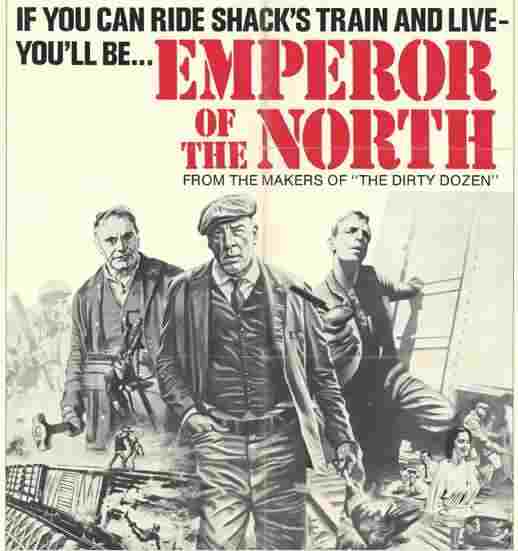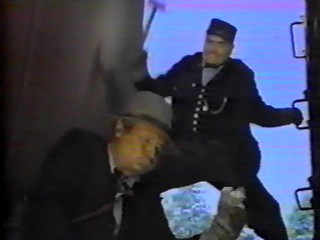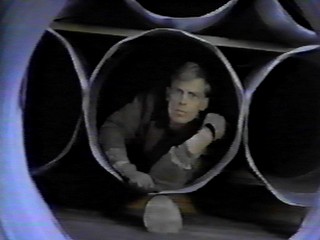
|
|
|
|
|
|
|
|
|
|
|
|
|
(1973) Director: Robert
Aldrich
Call him the one of big gapped tooth (With apologies to Wallace Stevens) I'd known about this movie for a long time, because of
its critical reputation. Whenever I came across a review of it during
my
many hours of reading, it was always a positive review that I read. So
I thought it would be Now get this straight - I didn't hate this movie, or even merely dislike it. In fact, I enjoyed the movie enough that I was happy to have seen it. And I'll probably watch the movie again sometime in the future. But I still felt let down by the movie. Maybe it was because I had read so many good reviews, I was expecting something close to a masterpiece. Maybe unconsciously I was expecting something close to a masterpiece after spending so much time searching for the movie - like a buried treasure that has to be uncovered by a lot of digging. I can't say for sure. I can say again that I did enjoy the movie despite it being flawed. And I will say that the movie, as it is, is well crafted enough so that the problems I had were generally not with what was in the movie - rather, generally what was not in the movie. This period drama takes place in 1933, at the height of
the Depression era, and focuses on a specific section of that era's
society
that's usually overlooked in modern day history books - the hoboes. In
the opening written crawl, the movie tells us that these unwanted
people
soon became a breed apart, enforcing their own and setting their own
rules.
A common habit hoboes shared was the use of the railroad; specifically,
they would hitch rides on freight trains so they Elsewhere in the railroad world is a renowned hobo who goes by the nickname "A No. 1" (Marvin), considered to be the champion hobo, or "Emperor Of The North Pole"(*) among his brethren. No doubt this earned moniker comes from his intelligence and resourcefulness when it comes to sneaking free rides, but probably also that he seems to be champion when it comes to following the unwritten hobo laws and customs right to the letter. He's also managed to grab a ride on every train, except for Shack's 19, and he is determined to not only be the first hobo to do so, but to make it all the way to Portland, Oregon. It isn't long before Shack gets wind of A No. 1's plan, and with his reputation also on the line, he is equally determined to make sure A No. 1 not only doesn't make it to Portland, but not even get aboard. Complicating matters further for A No. 1 is the sudden appearance of "Cigaret" (Carradine), a youthful newcomer hobo who is also determined to ride Shack's train, and isn't deterred by A No. 1 yelling statements like, "You're a casual! You ain't even seen a first-class hobo!" at him - and A No. 1 is torn between shaking off Cigaret or teaching him the ways of the trade so that he can be "a good bum". Before I get into what bothered me most about this
flawed
but entertaining movie, let me first give it praise where it is due,
starting
with its craftsmanship on a technical level. This is a very
good-looking
movie; shot on location in various parts of Oregon, the forest and
semi-arid
backdrops are always very pleasing to the eye. (Considering that the
events
in the movie are taking place in October, however, it does seem to be
an
unusually warm autumn!) It also appears that the set designers and the
prop department did Getting to the script, the movie instantly has one attribute to its favor, and it is with its originality. Even after some thought, I can't think of another movie before or after it which even starts to approach the main plot threads of this movie. Not only is the movie an original, it always keeps your interest. Though the script has those flaws that I will discuss later, there is always something entertaining going on. It will be a long time before I forget some really priceless moments in this movie. There's the scene where A No. 1 goes from being a fugitive from a pursuing policeman to giving the poor officer a thorough humiliation without laying a finger on him, and also when A No. 1 all of a sudden lets himself be baptized, though not because he has been born again. The movie also has its share of suspenseful moments mixed with the humorous, such as when Shack's recklessness (and A No. 1's interference) suddenly put the possibility of mass death on the rails, Shack's sadistic attack on A No. 1 and Cigaret with the crudest of homemade tools, and Cigaret struggling to stay alive and hidden from Shack on a high bridge (though it does have a somewhat humorous punchline.) You actually see Carradine struggling from a great
height
from the ground in that scene, and you also see him, Borgnine, and
Marvin
climbing all over the train during the course of the movie instead of
stuntmen.
This just adds to the real conviction all three actors put to their
roles.
Carradine plays Cigaret at just the right pitch, being convincingly
annoying
and arrogant, yet leaves in that slight edge of potential that even
Marvin's
hard-headed character can see. Marvin was a wise choice to play A No.
1,
seeing how successful he was in movies like Point Blank,
playing thugs who are tough yet have a good deal of brains. And with
Borgnine
previously successful in playing sadistic bullies in movies like From
Here To Eternity, it was only natural that only he could play
the
bloodthirsty Shack. All three actors are great, bringing the maximum
enjoyment
possible with the material they are given. But - and this is no fault
of
the actors - there is only so much that they can do, because of the
screenplay.
Each of the three characters is intriguing, so much so that I wanted to
know more. But the screenplay didn't tell me what I wanted to know. The screenplay also fails to give us an in-depth look at the hobo culture, despite the fact that the movie spends almost all of its running time on the railway or in the hobo camps. Even some brief insight, such as how the hobo camps were governed, would have added some small but pleasing flavor to the proceedings. On the other hand, some praise should be given to the screenplay for adding a couple of interesting themes that keep popping up in the course of the movie. One reoccurring thing is the theme of obsession. A No. 1 is obsessed with being "A No. 1", Cigaret is obsessed with a similar goal, and it could be argued that Shack's efforts to keep bums off of his train may be an unconscious effort to be number one, at least in the train conductor profession. Though all three obsessions may have a striking similarity, just how far these three men are willing to go are all different, and it's interesting to compare their different codes and practices. Speaking on that subject, the movie also keeps giving us a side-by-side comparison of A No. 1 and Cigaret, by having the two hoboes practically doing the same things together, usually at the same time. For example, take a look at when the two spread grease on the tracks. A No. 1 uses a stick so his hands won't get dirty, but Cigaret not only uses his hands, but spreads the grease incorrectly until A No. 1 indicates to him how to do it correctly. I really enjoyed these subtle touches to the movie,
because
it showed that some effort was made to not only entertain the audience,
but make them think a little, so they would have something to hold onto
after the movie was over. If only this kind of effort went into
fleshing
out the characters and the society that they live in. As the movie is
now,
I consider it worth a ride to your video store to look for it, but even
then I can't help but simultaneously look at the movie at a different
angle
and seeing all the lost opportunities. * The movie was in fact originally named Emperor Of The North Pole, but it was subsequently changed to what it is now, no doubt due to the possibility of audiences getting the wrong idea of what the movie was about.
Check for availability on Amazon (VHS) See also: Bad Company, An Enemy Of The People, Your Three Minutes Are Up |
 a good movie to
review for this site seeing that
even though it had received a lot of critical acclaim, the movie seems
all but forgotten by the general public today, though it does have a
sizable
cult. (I don't know how well the movie did during its initial
release.)
But it was tough finding a copy; for a long time, 20th Century-Fox had
it included in their long list of movies that would make at the very
least
a decent amount of cash if released on video (such as
a good movie to
review for this site seeing that
even though it had received a lot of critical acclaim, the movie seems
all but forgotten by the general public today, though it does have a
sizable
cult. (I don't know how well the movie did during its initial
release.)
But it was tough finding a copy; for a long time, 20th Century-Fox had
it included in their long list of movies that would make at the very
least
a decent amount of cash if released on video (such as  could go around the
country
to look for work. Between them and their source of survival, however,
was
The Railroad Man - the conductor of the trains who would do what he
could
to keep these hoboes off of his train. One of these conductors - Shack
(Borgnine) - has a distinction that no other railroad conductor has; he
has managed to keep Train 19 completely free of hoboes seeking a free
ride.
We find out why he has managed to do this in the opening sequence,
where,
just before a gruesome (despite it being actually not so bloody)
payoff,
Shack is seen cold-bloodedly murdering an unfortunate hobo who attempts
to sneak a ride.
could go around the
country
to look for work. Between them and their source of survival, however,
was
The Railroad Man - the conductor of the trains who would do what he
could
to keep these hoboes off of his train. One of these conductors - Shack
(Borgnine) - has a distinction that no other railroad conductor has; he
has managed to keep Train 19 completely free of hoboes seeking a free
ride.
We find out why he has managed to do this in the opening sequence,
where,
just before a gruesome (despite it being actually not so bloody)
payoff,
Shack is seen cold-bloodedly murdering an unfortunate hobo who attempts
to sneak a ride.
 their homework as well; though I
can't begin to claim
to be an expert of life during this part of the twentieth century,
nothing
wheeled in front of the camera struck a bad note. I think I should also
mention that the cinematography is a major asset as well, giving
everything
natural as well as man-made that extra hint of authenticity. It was
careful
enough to give everything a kind of warm glow, while not making the
mistake
to make everything look too sharp and polished. We're in an era of hard
times, and anything that looked too posed and not worn out would ruin
the
warmth.
their homework as well; though I
can't begin to claim
to be an expert of life during this part of the twentieth century,
nothing
wheeled in front of the camera struck a bad note. I think I should also
mention that the cinematography is a major asset as well, giving
everything
natural as well as man-made that extra hint of authenticity. It was
careful
enough to give everything a kind of warm glow, while not making the
mistake
to make everything look too sharp and polished. We're in an era of hard
times, and anything that looked too posed and not worn out would ruin
the
warmth.
 What
was Cigaret's background, and why was he so determined to become a
railway
bum? How did A No. 1 become a bum, and how did he become so good at it?
Why is he now so determined to be the Emperor Of The North Pole? As for
Shack, why is he so filled with hate for those below him? Why does he
care
he has a widespread reputation, and why is he so determined to keep it?
We never find the answers to these questions, and it's quite
frustrating
how the movie tantalizes us but never comes clean.
What
was Cigaret's background, and why was he so determined to become a
railway
bum? How did A No. 1 become a bum, and how did he become so good at it?
Why is he now so determined to be the Emperor Of The North Pole? As for
Shack, why is he so filled with hate for those below him? Why does he
care
he has a widespread reputation, and why is he so determined to keep it?
We never find the answers to these questions, and it's quite
frustrating
how the movie tantalizes us but never comes clean.